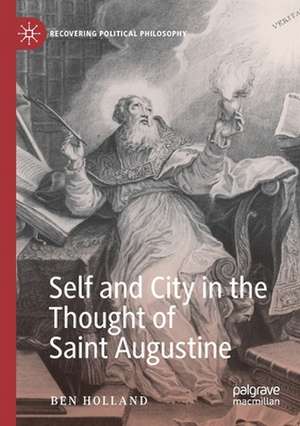Self and City in the Thought of Saint Augustine: Recovering Political Philosophy
Autor Ben Hollanden Limba Engleză Paperback – 16 aug 2020
| Toate formatele și edițiile | Preț | Express |
|---|---|---|
| Paperback (1) | 577.07 lei 43-57 zile | |
| Springer International Publishing – 16 aug 2020 | 577.07 lei 43-57 zile | |
| Hardback (1) | 585.26 lei 43-57 zile | |
| Springer International Publishing – 16 aug 2019 | 585.26 lei 43-57 zile |
Din seria Recovering Political Philosophy
-
 Preț: 382.95 lei
Preț: 382.95 lei -
 Preț: 382.75 lei
Preț: 382.75 lei -
 Preț: 386.61 lei
Preț: 386.61 lei -
 Preț: 384.86 lei
Preț: 384.86 lei -
 Preț: 357.43 lei
Preț: 357.43 lei - 15%
 Preț: 702.24 lei
Preț: 702.24 lei - 18%
 Preț: 726.06 lei
Preț: 726.06 lei -
 Preț: 382.75 lei
Preț: 382.75 lei -
 Preț: 386.81 lei
Preț: 386.81 lei -
 Preț: 265.36 lei
Preț: 265.36 lei -
 Preț: 211.29 lei
Preț: 211.29 lei - 15%
 Preț: 646.75 lei
Preț: 646.75 lei - 18%
 Preț: 728.28 lei
Preț: 728.28 lei - 8%
 Preț: 487.94 lei
Preț: 487.94 lei - 15%
 Preț: 641.71 lei
Preț: 641.71 lei - 18%
 Preț: 786.98 lei
Preț: 786.98 lei -
 Preț: 201.06 lei
Preț: 201.06 lei -
 Preț: 214.57 lei
Preț: 214.57 lei - 15%
 Preț: 579.20 lei
Preț: 579.20 lei -
 Preț: 176.74 lei
Preț: 176.74 lei - 15%
 Preț: 583.61 lei
Preț: 583.61 lei - 18%
 Preț: 777.20 lei
Preț: 777.20 lei - 15%
 Preț: 693.57 lei
Preț: 693.57 lei - 15%
 Preț: 698.30 lei
Preț: 698.30 lei - 18%
 Preț: 727.97 lei
Preț: 727.97 lei - 18%
 Preț: 786.18 lei
Preț: 786.18 lei -

Preț: 577.07 lei
Preț vechi: 678.91 lei
-15% Nou
Puncte Express: 866
Preț estimativ în valută:
110.42€ • 115.58$ • 91.91£
110.42€ • 115.58$ • 91.91£
Carte tipărită la comandă
Livrare economică 31 martie-14 aprilie
Preluare comenzi: 021 569.72.76
Specificații
ISBN-13: 9783030193355
ISBN-10: 3030193357
Pagini: 162
Ilustrații: XXI, 162 p. 6 illus. in color.
Dimensiuni: 148 x 210 mm
Greutate: 0.23 kg
Ediția:1st ed. 2020
Editura: Springer International Publishing
Colecția Palgrave Macmillan
Seria Recovering Political Philosophy
Locul publicării:Cham, Switzerland
ISBN-10: 3030193357
Pagini: 162
Ilustrații: XXI, 162 p. 6 illus. in color.
Dimensiuni: 148 x 210 mm
Greutate: 0.23 kg
Ediția:1st ed. 2020
Editura: Springer International Publishing
Colecția Palgrave Macmillan
Seria Recovering Political Philosophy
Locul publicării:Cham, Switzerland
Cuprins
1. Introduction: St Augustine of Nottingham.- 2. The Goodnes of All That Is.- 3. The Prideful Soul and the Pilgrim City.- 4. The Unself and the Pilgrim City.- 5. The Saint and the City of God.- 6. Conclusion: Distension, Attention, Extension, Intention.
Notă biografică
Ben Holland is Associate Professor of International Relations at the University of Nottingham, UK, and a Fellow of the Royal Historical Society. He is the author of The Moral Person of the State: Pufendorf, Sovereignty and Composite Polities (2017).
Textul de pe ultima copertă
Self and City in the Thought of Saint Augustine provides a detailed exegesis of the analogy between the self (as body and soul, always in relation to other such beings) and the city (or political society) in the thought of St. Augustine of Hippo (354-430). The analogy between the individual human being and the ‘state’ is one of the most important themes in the history of political thought. Attempts have been made to understand the state by examining the soul (since Plato and Aristotle), the body (as in medieval theories of the body politic), and the person (most influentially in Hobbes, surviving to this day in such concepts as international legal personality); and yet, the Augustinian part of the story is not at all well known. This is the lacuna that this book aims to fill. It argues that Augustine develops three analogies between the self and the city as a society ordered by love: self-love in the case of the Earthly City; divided but improving love in the Pilgrim City;and love of others and of God in the City of God. Therefore, it supplies an overview of Augustine’s intellectual ‘system’ as it touches upon theology, ecclesiology, psychology and anthropology, as well as politics. The book also provides a new interpretation of Augustine’s important definition of the republic, which is the aspect of his political theory that is most often discussed by contemporary commentators.
Caracteristici
Offers insights of interest to Augustine scholars across a wide array of disciplines such as political science, theology, philosophy, history, and classics Provides a new interpretation of Augustine’s important definition of the republic Written to be accessible to upper-level undergraduates whilst rigorous scholarship and original interpretations mean that it will also appeal to graduate students and peer researchers
